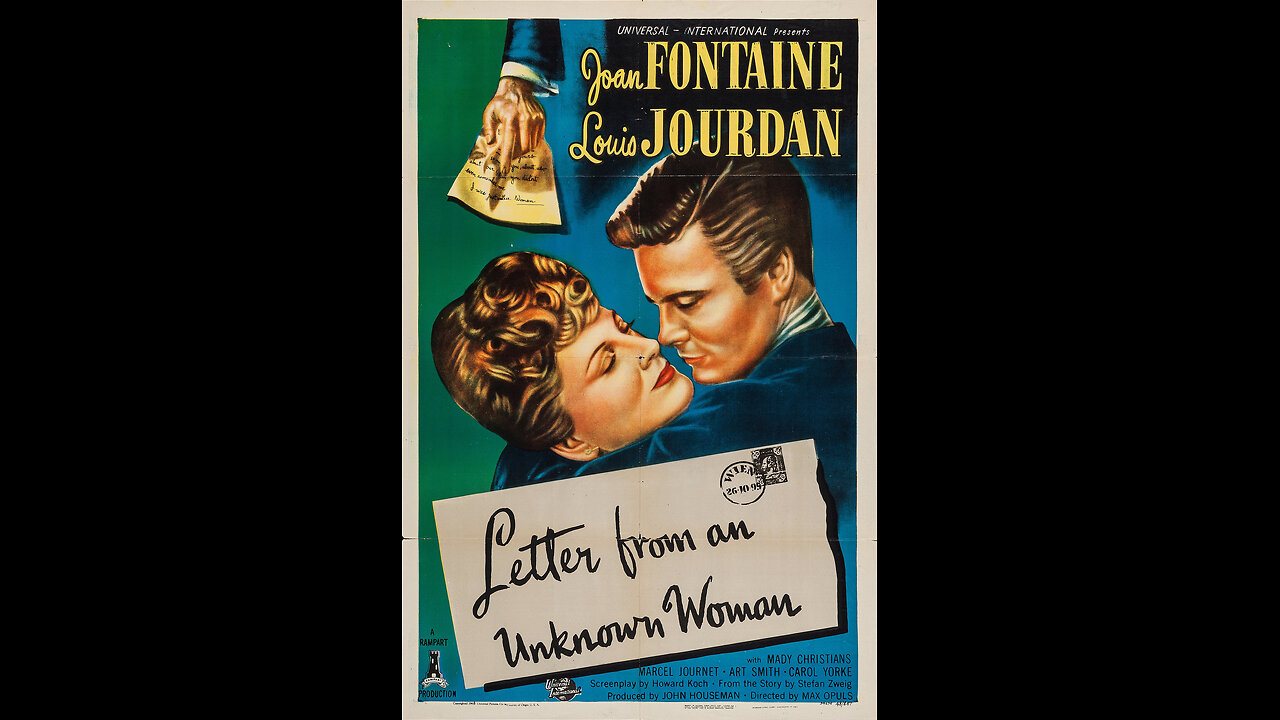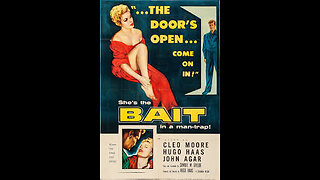Premium Only Content

Letter from an Unknown Woman (1948) | Directed by Max Ophüls
"Letter from an Unknown Woman" is a classic romantic drama that has captivated audiences since its release in 1948. Directed by Max Ophüls, known for his elaborate camera movements and visually stunning compositions, this film stands as a testament to his artistic vision. The screenplay, crafted by Howard Koch, is based on a novella by Stefan Zweig, and it unfolds in a flashback structure that adds depth and poignancy to the narrative.
The story is set in Vienna in the early 20th century and revolves around a pianist, Stefan Brand (played by Louis Jourdan), who receives a letter from Lisa Berndle (portrayed by Joan Fontaine), a woman he does not remember. Through the letter, Lisa recounts her lifelong love for Stefan, beginning from her adolescence and spanning several decades. Despite her deep affection for him, their paths cross at moments when Stefan, a man of fleeting passions and pursuits, fails to recognize the depth of Lisa's feelings. The film is a poignant exploration of unrequited love, memory, and the passage of time, told with a blend of elegance and emotional intensity that is characteristic of Ophüls' directorial style.
"Letter from an Unknown Woman" is widely regarded as a masterpiece of romantic cinema. Its narrative is both intimate and epic, capturing the intricacies of love and loss against the backdrop of a changing society. Ophüls' direction is meticulous, utilizing sweeping camera movements to enhance the emotional landscape of the film. Joan Fontaine delivers a performance of nuanced vulnerability, bringing to life the character of Lisa with grace and depth. Louis Jourdan complements her with a portrayal that captures the charm and thoughtlessness of Stefan, making their tragic love story all the more poignant. The film's visual style, including its use of lighting and set design, contributes to the evocative atmosphere that defines this classic.
While "Letter from an Unknown Woman" is celebrated for its craftsmanship and emotional depth, some contemporary viewers might find its pacing slow in comparison to modern cinema. The narrative's focus on a woman's unrequited love and her idealization of Stefan may also be critiqued from a modern feminist perspective, questioning the portrayal of female agency within the story. However, these criticisms are often viewed through the lens of the time in which the film was made, acknowledging its historical context and the conventions of the romantic genre during that era.
"Letter from an Unknown Woman" (1948) is a film that endures as a poignant exploration of love and memory, celebrated for its direction, performances, and visual storytelling. Directed by Max Ophüls and featuring memorable performances by Joan Fontaine and Louis Jourdan, it remains a touchstone of classic cinema, offering a rich cinematic experience that resonates with audiences even decades after its release. Its enduring appeal lies in its ability to capture the timeless and universal aspects of human emotion, rendered with artistic finesse and emotional depth.
-
 1:19:31
1:19:31
Classic Films & Movies Archive
17 hours agoBait (1954) Directed by Hugo Haas
61 -
 39:56
39:56
BonginoReport
3 hours agoTrump Alpha-Males Colombia (Ep.126) - 01/27/2025
58.1K96 -

Jeff Ahern
2 hours ago $1.31 earnedMonday Madness with Jeff Ahern (6am Pacific)
10K2 -
 1:21:30
1:21:30
Game On!
11 hours ago $1.94 earnedPatrick Mahomes does it AGAIN!
14.9K8 -
 15:20
15:20
Misha Petrov
3 hours agoReacting To Liberal MELTDOWNS Over Trump’s Return - Gen Z Is Planning a REVOLUTION?!
23.8K16 -
 18:22
18:22
Neil McCoy-Ward
3 hours agoThe 🇨🇴 Colombian President Just Learned The HARD WAY!!! (Another Win For The USA 🇺🇸)
38.3K14 -
 1:56:04
1:56:04
TheDozenPodcast
18 hours agoMass deportations, Islamists, Saving the UK: Nick Tenconi
41.4K23 -
 35:24
35:24
Survive History
23 hours ago $11.37 earnedCould You Survive in a Cavalry Regiment During the English Civil War?
105K10 -
 28:15
28:15
Degenerate Plays
18 hours ago $4.92 earnedTwo Birds' Secret Meeting - Gotham Knights : Part 26
83K7 -
 12:29
12:29
Mr. Build It
6 days agoWish I Knew This Before I Started Building It
76.1K27